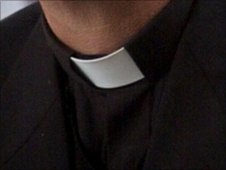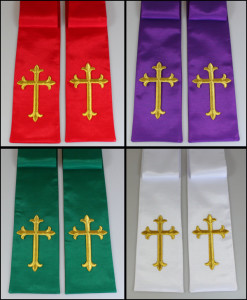
He will keep his entrance rank except in service at the altar…
Where is the discipline in our discipleship?
Again and again the Rule of St. Benedict causes me to reflect on my vocation to the priesthood. The ordering of the church with it’s various designated roles and callings which overlap and yet remain distinct is a confusing subject and it gets increasingly so as people try to re-order and make room for individuals as they explore their specific ‘charism’.
After the last two week’s reflections I begin to see clearly the challenge and, potentially, the call of God on the Anglican Church.
Where is the discipline within our discipleship?
This is a particularly important question when it comes to vocation. There seem to be so many different ‘ministries’ available but with our commitment to ‘the three fold order of ministry’ there is a natural hierarchical view of ministry built into the Church. We can try and promote the work of the laity but Canon Law, which governs and shapes us, forces us to hold the offices of bishop, priest and deacon higher than others. These three offices have wide ranging specifications outlined in the ordinals that it begs the question what is it that designates a priest from the rest of the people of God.
I have sat with the ordinal many times and prayed through it. I can’t help but feel overwhelmed by everything I am asked to be and do. I’m glad that the response to whether I can fulfil all that is asked of me is,
By the help of God, I will.
But even after I relinquish some of the responsibility onto the grace of god I still have to ponder when non-ordained members of the Church take solemn vows to participate in the work of the Church? If all these tasks fall on to the ordained only what is left for the laity to do and participate in?
My question is about how to value properly the work of all the people of God and not demand that, in order to be able to do any ministry, you need to be ordained. To put it another way: how do we stop the personalising of ordained orders in order that all vocations are rightly affirmed.
Changing tack, or rather to focus in on a particular issue; I am not against the Fresh Expressions movement nor the role of Pioneer Ministers (indeed I am active within it!) but there is a real challenge that is raised by the mixed economy of what exactly constitutes a call to the diaconate, the priesthood and to episcopal office. There is an argument that Ordained Pioneer Ministers are being given ‘time off’ to pursue the work that all people and ordained ministers should be doing anyway. ‘Non-pioneer Ministers’ argue that they would love to be creative and missional if only they had the time but their diaries are full of the ‘nuts and bolts’ of ordained ministry. Specifying ‘Ordained Pioneer Ministry’ from the ordained ministry has caused many to feel excluded from the work of contextual mission.
I have always and continue to argue that Ordained Pioneer Ministry is a necessary move by the Church of England in order to raise these questions and conversations and I feel we should be looking to use the questions to solidify our view of the three fold order of ministry. The experience of Ordained Pioneer Ministers should be helping to release and encourage ‘Non-pioneer Ministers’ to be pioneering. Whether this pioneering is done by laity or ordained ministers is a real question. For what it’s worth I suspect most of it should be done by laity but that does not release clergy from the responsibility to participate too.
If I was to be bold in putting forward a real pathway to fruitful debate it would be to propose that all disciples should be pioneers as we respond, through the Spirit, to the call of God to all his people to share the good news and herald in his kingdom. All disciples ordained or not should be looking at ways to do mission and evangelism in their particular context. Once our discipleship bears its fruit in the form of outreach and kingdom building we can then re-examine the role of deacons, priests and bishops within that.
As it stands we are trying to solve a problem in the wrong part of the system!
Like St. Benedict’s monasteries, the call to the priest comes from an established discipleship programme where everyone is subject to the same training and discipline. From this place, 62 chapters in, we then discuss the practical role of presiding at the Eucharist and leading the disciples in prayers. The role of priest does not change their need to follow the discipline of the community. They are priest at the table.
Here priesthood is not the same as leadership.
To be a leader you do not need to be a priest. It is thought that the abbot was not necessarily ordained as a priest and this makes for a fascinating insight into hierarchy in these religious communities. The abbot remains as spiritual leader whilst the priest has a different function. Terence Kardong explores this differences in his book ‘Together Unto Life Everlasting’, proposing that,
…the power of the bishop/priests is of sacramental order, that of the abbot is charismatic. The first power comes from the church: the second comes from the Holy Spirit. (Esther de Waal, A Life Giving Way: a commentary on the rule of st benedict (London: Continuum, 1995) p232)
That distinction is worth noting. I have been struggling to articulate that feeling for some time. My understanding and call to the priesthood is a sacramental order, a function of sorts. My call to specific areas, people or contexts is a charismatic one. All disciples are called to charismatic ministries; ministries that are contextual and unique within the shared call to share the gospel. Some are called to sacramental roles and that is a church function.
The Church, in my mind, should explore specifying better the three fold order of ministry so that those not called to a sacramental role are still encouraged in participating with equal anointing to the life and mission of Christ’s Church. There must be a greater articulation that those given an ordained office in the Church are not seen as of a higher rank or calling. They remain disciples but with a particular, sacramental role. Other disciples are called by the Holy Spirit with charismatic roles which should be honoured and encouraged.
There are parts of my job which I do because it’s my office (presiding at Holy Communion, visiting the sick and baptizing new believers, etc.) but there are other things I do because I feel the Holy Spirit calling me to do at that time and place (community chaplaincy, encouraging artists in the city, gathering and leading a small home group, etc.). Some are tasks that I alone can do in our community because they are sacramental, but many other tasks that I do as a disciple and not as a priest to which others may also be called to do. The specifying of these different tasks needs to be done more intentionally to release disciples into the work that they are called to do as disciples, ordained or not.
Reflection
As I contemplate moving from my curacy into a parish of my own, I think about how I will minister in the new context. There will be sacramental tasks I am called to do because God has called me to be a priest and the Church has acknowledged that. There will also be other things that I will discover God is calling me to, not because I am a priest, but because I am a disciple.
Our question should be, within the parish, should there be a distinction between the abbot and the priest? I would argue there’s room for this framework. It would require a rethink of how the Church views and discusses ordained ministry and that of lay ministry. I think God is already moving in this area as increasingly stretched ordained ministers find themselves forced into ever-widening job specifications and expectations. As more churches find themselves in longer interregnums and more multi-parish benefices are created, less ordained ministers feel ‘called’ to the struggling (mostly rural) contexts due to the ‘killer workloads’ and overwhelming pressures, as well as not fully understanding the discipline of discipleship. I speak from personal experience, here. It was in the intensity of college that I discovered the cost of discipleship (and I came from a ‘successful’, growing church).
We can any longer hide the charismatic call of all disciples to contextual mission in its infinitely varied forms. The praise and holiness of ‘leadership’ and the pursuit for better equipped leaders is futile as we increasingly discover that what is being asked of them should be the work of all disciples. To require a title like ‘leader’ or to need ordination to encourage someone in doing the work of the kingdom is a failure on our discipleship. Leaders come from a fully functioning discipleship programme (as we’ll explore in two weeks time). Naming someone a leader and then asking them to find followers is illogical to me.
You’ll be aware that I am convinced that only a focussed, intentional re-examination of the real life of discipleship where commitment is paramount and better more systematic re-ordering of God’s Church to ensure the discipline of humility is at the heart of all we are and do is needed!
Loving Father, gracious and powerful, you call us to be converted from our old life to new life in Christ. You have adopted us as your children and grant us true peace, found when we know our identity in Christ. Continue to call us closer to you that we would live in the freedom of your grace and that others would see your good work in us that hey to would respond to your call on their lives also.
Come, Lord Jesus.

 Cassock Alb: Is a white garment that goes over clothes. This symbolises a clothing of the wearer in heavenly glory. This is about identifying the role of the leader of worship and not the person wearing it. The leader of worship is an expression of the character of the whole company of worshippers; they are to be the spokesperson of the collective voice of the congregation. By draping them in white it is a draping of all the people in that resurrection glory.
Cassock Alb: Is a white garment that goes over clothes. This symbolises a clothing of the wearer in heavenly glory. This is about identifying the role of the leader of worship and not the person wearing it. The leader of worship is an expression of the character of the whole company of worshippers; they are to be the spokesperson of the collective voice of the congregation. By draping them in white it is a draping of all the people in that resurrection glory.

 Cassock: Is a black garment similar to that of the Cassock Alb. At the reformation the Cassock Alb was seen as a symbolism of the abuses of clericalism where the clergy and those ordained were seen as being elevated beyond the reach of the laity. The reformers were keen to bring the work of the Church to the people and so they removed the symbolism. This reformation was focussed on the words used in the Church, hence the translation of the Bible into the common tongue. The reformation replaced the priest with the scholar, those who could read and interpret the Scriptures and the Cassock hints at the origins of being like the university gowns or the preaching monks (of which Calvin and Luther were).
Cassock: Is a black garment similar to that of the Cassock Alb. At the reformation the Cassock Alb was seen as a symbolism of the abuses of clericalism where the clergy and those ordained were seen as being elevated beyond the reach of the laity. The reformers were keen to bring the work of the Church to the people and so they removed the symbolism. This reformation was focussed on the words used in the Church, hence the translation of the Bible into the common tongue. The reformation replaced the priest with the scholar, those who could read and interpret the Scriptures and the Cassock hints at the origins of being like the university gowns or the preaching monks (of which Calvin and Luther were).

